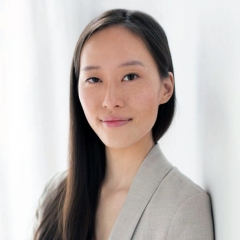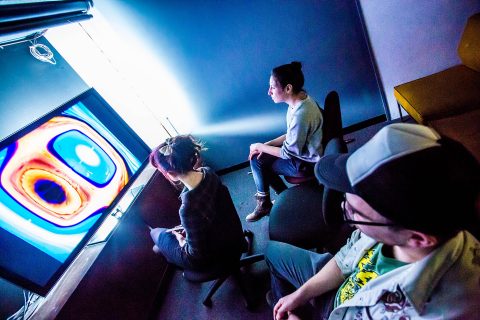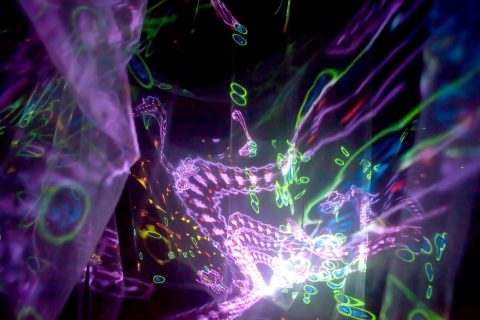Computer Science – Computation Arts (BCompSc)
Virtual information sessions
Want to know how we're training the next generation of engineers and computer scientists? Join us to learn about the Gina Cody School's undergraduate programs and plans to advance integrated technologies in a socially responsible manner.
Why study Computer Science – Computation Arts?
Stimulate the senses. Engage the mind. When you study Computation Arts, you become a digital artist, using algorithms and computational theory to create interactive multimedia that breaks new audio-visual ground.
The degree gives students the flexibility to combine a traditional computer science degree with a non-traditional field. Our state-of-the-art labs for 3D graphics, high-performance computing and artificial intelligence will give you experience with the equipment you’ll use in the field. Through labs, lectures and projects, you’ll also:
- Investigate programming paradigms as they relate to digital art and design
- Learn the techniques and conceptual strategies central to 3D digital production
- Use computer systems to process, synthesize, and manipulate digitized representations of sound
Special funding for out-of-province students
Up to $4000 for undergraduate programs.
Program structure
A Bachelor of Computer Science degree takes a minimum of three or four years (90 – 120 credits) of full-time study, depending on your academic background.
The core provides a basic and broad study of theory, mathematical basics, programming methodology, computer architecture, data structures, operating systems, and software engineering.
Students in this program will also take half of their courses in the Computation Arts program offered by the Faculty of Fine Arts.
We offer an honours program to computer science students with high academic standing. You may apply to the honours program once you have completed 30 credits.
Courses
Co-op program
The Co-op program, available with the BCompSc, gives you the chance to complete paid work terms that last 12 to 16 weeks. As a Co-op student, you will assist in projects designed and implemented by professionals and may also:
- Analyze and develop computer solutions
- Design and create new software, and modify and test existing software used in a broad range of businesses and industries
- Plan and implement computer security systems for database access control
Co-op students have completed work terms for employers such as:
- Alcatel-Lucent
- Bell Canada
- Cogeco
- Ericsson
Admission criteria
This program is available for Fall admission only.
Minimum cut-off averages and course requirements for admission
- Quebec CEGEP: 27 overall, 26 math
- Admission is based on applicants’ overall Math CRC indicated above and completion of the following classes as part of their DEC: Calculus 1 and Calculus 2 and Linear Algebra
- Students completing one of the eligible technical DECs may qualify for admission without the listed prerequisites. However, if the prerequisites are taken, a minimum of 26 in math is required.
- Eligible technical DECs include 420.A0/BO/AA
- Advanced standing may be possible
- Additional information for CEGEP applicants
- High School: A- overall, A- math
- Canadian curricula course requirements
- Accepted international qualifications
- One math from Pre-Calculus, Calculus, or equivalent
- ACT or SAT is not required
- AP exams are not required but may qualify you for advanced standing
- International Baccalaureate (IB) diploma: 33 overall, 5 HL or 6 SL math
- one math (Applications and Interpretations HL, Analysis and Approaches HL or Analysis and Approaches SL)
- International Baccalaureate Career-related Programme (CP): 33 overall, 5 HL or 6 SL math
- Baccalaureate français: 15 overall, 15 math
- British system of education (GCE):
- A-levels: At least two A-level exams AB, A in math or
- AS-levels: At least 4 AS-level exams with equivalent results or
- BTEC: Level 3 Diploma or Extended Diploma in a related subject area with equivalent results
- Students without a math A-level may be admissible based on AS-level or iGCSE/GCSE/O-Level exam results. Students should include all their exam results from iGCSE (or equivalent) onwards to support their application.
- Additional information for British System of Education (GCE) applicants
- University transfers (internal): 3.0 overall, 3.0 in math, 2.3 in courses offered by the Gina Cody School of Engineering and Computer Science
- At least two of the following (or equivalent): MATH 203, 204, 205
- University transfers (external): A- overall, A- math
- Courses in the disciplines of Calculus and Linear Algebra
- Applicants who do not meet the minimum entry requirements are encouraged to apply and may still be considered for admission, provided they have completed the majority of the prerequisite courses. Transfer credits may be considered on a course-by-course basis.
Additional requirements for admission
Applicants must submit additional requirements for admission directly to the department.
- Portfolio required
- Letter of Intent
Students must submit a portfolio with their application.
Minimum cut-off averages should be used as indicators. The cut-off data may change depending on the applicant pool. Applicants who meet the stated minimum requirements are not guaranteed admission to these programs.
Application deadlines
It’s not too late to apply
Most undergraduate programs are still accepting applications for fall 2025.

FALL ENTRY (September)
Deadline: March 1
International applicants: Apply no later than February 1 to allow time for immigration document processing. However, applying earlier is strongly recommended. Immigration processing times vary by country, and delays could prevent you from starting your studies on time.

WINTER ENTRY (January)
Admission to this program is available for the Fall Term only.
We reserve the right to close admission to a program at any time after the official deadline without prior notice.
Funding note
Quebec residents who enroll in certain programs and meet the eligibility criteria may apply for funding of $2,500 per term through the Quebec Perspective Bursary (Bourse Perspective Quebec).
United States students: A U.S. Federal Student Aid-eligible version of this program is offered. This version meets all U.S. regulations (such as no co-operative education or e-courses) for eligible programs.
After your degree
Computation Arts alumni have established careers in the advertising and entertainment industry as programmers and designers. Some graduates have been hired by:
- Ubisoft
- Moment Factory
- Sid Lee
- Electronic Arts
- Warner Brothers Interactive
Student story

Doris Oh
Bachelor of Engineering Option: Civil Infrastructure (Co-op)
There are plenty of opportunities to follow your curiosity in the Gina Cody School of Engineering and Computer Science, where Doris Oh dives into her first internship through Co-op.
Other programs of interest

The Computer Applications option gives doubly passionate students the flexibility to combine a traditional computer science degree and with a non-traditional field. Though many students complete a Major in Computation Arts or a Major in Mathematics and Statistics, students may declare a major or minor in any area outside the Faculty of Engineering and Computer Science.
Department
Department of Computer Science and Software Engineering
Faculty

If you want to be a pioneer, exploring relationships between emerging and existing media technologies and the fine arts, then this program for you.
Department
Faculty

Stimulate the senses. Engage the mind. When you study Computation Arts, you become a digital artist, using algorithms and computational theory to create interactive multimedia that breaks new audio-visual ground.
Department
Department of Design and Computation Arts
Faculty


